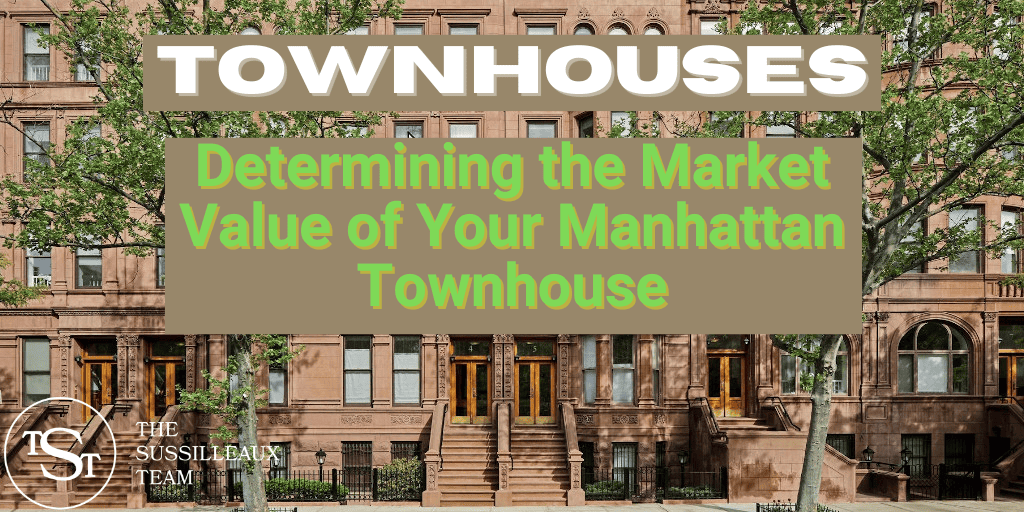Introduction to Manhattan Townhouse Market Valuation
Determining the market value of a Manhattan townhouse is a crucial step in the selling process. Accurate market valuation ensures that you list your property at the right price, which can help attract potential buyers and lead to a successful sale. This article will explore the factors influencing the market value of your townhouse, methods for estimating its value, and how to work with a real estate agent to maximize your property’s worth.
We have seen many townhouses for sale over our years of experience as Manhattan real estate brokers. We find that valuing townhouse properties to be especially interesting because they’re not cookie cutter properties. It’s an opportunity for us to apply our expertise to factor in all the pricing subjective nuances that are unique to townhouses.
Factors Influencing the Market Value of Your Manhattan Townhouse
Neighborhood And Location
The location of your townhouse plays a significant role in determining its market value.
Proximity to amenities such as shopping, dining, parks, and public transportation often adds to a property’s desirability. Additionally, the reputation and desirability of the neighborhood itself can impact the market value of your townhouse.
While location and neighborhood always matter, We find that it is especially important for townhouses. The most desirable townhouses are quiet tree-lined side streets lined with beautiful townhouses.
Architectural Style and Historic Significance
The architectural style and historical significance of a townhouse also affects its price. Townhouses with distinct architectural features or a rich history will generealy command a premium.
Historical significance is especially relevant for townhouses. They are not merely buildings, but a window into a charming previous version of the city and the lifestyle of the former owners. A good portion of a townhouse’s value is this emotional connection to property ownership in a different time.
Property Size and Layout
The size and layout of your townhouse are also important factors that influence its market value. Building width, square footage, the number of bedrooms and bathrooms, as well as any unique features or architectural details, can significantly affect the value of your property. For example, a townhouse with a spacious outdoor area, high ceilings, or a well-designed floor plan may command a higher price than a comparable property without these features.
Condition is critical because of the cost of renovating a NYC townhouse. I have investor clients who buy shells of buildings, and then spend millions to bring them up to pristine condition.
PRO TIP: Building Width
It is important for my clients to understand how much building width affects the value of their property.
Here is my brief explanation:
Because of the nature of the lots that townhouses are built on are long and narrow, townhouses can appear cramped because there are no windows along the length of the property. That’s why in the world of townhouses, width is king and has a tremendous impact on its’ value.
Most interestingly, the effect of width on price is not linear. Specifically, if a 16 foot wide townhouse is worth X dollars, the increase in value as buildings get wider through 17, 18, 19 feet and beyond, the increase in value from each jump is bigger than the last. So in the narrower buildings width differences may hypothetically be worth $100,000/foot, and in the wider buildings the differences in wider buildings may be $400,000/foot.
Property Condition and Maintenance
The overall condition of your townhouse is another critical factor that impacts its’ market value. A well-maintained property that has undergone recent renovations or updates will typically fetch a higher price than one that requires extensive repairs or has outdated features. Regular maintenance and necessary improvements can preserve your townhouse’s value and make it more appealing to potential buyers.
PRO TIP: Condition and staging matters
Unless your property is a multifamily rental or a candidate for a gut renovation, condition and “show -ability” is critical.
In all our experience with all types of properties, we can confidently state that:
Purchasing real estate is an emotional process.
Assuming you have access to sufficient financing, 90% of the buying decision is emotional. And what better feeds emotion engagement than property condition and staging? The better job you do creating a blank canvas that the buyer can project their lives on, the more successful your will be.
Market Trends and Comparable Sales
Current real estate market conditions in Manhattan and the recent sales of similar properties in the area can provide valuable insights into the market value of your townhouse. Understanding the local market trends, including the average days on market and the sales-to-list price ratio, can help you price your property competitively and attract the right buyers. By analyzing comparable sales, you can gauge how your townhouse stacks up against similar properties and establish a competitive asking price.
Case Study: A happy seller
Background:
We recently had a personal experience that demonstrates some of the principles of valuing a townhouse.
We met with a potential seller and toured her lovely townhouse. The home was showing its’ age, but retained most of the original detail and mill work. The property had been in her family for over 70 years. She loved her home, but it was time to downsize.
The Issue:
Because she had been there so long, she wasn’t aware of how much her property appreciated over time. She also hadn’t put a lot of money into maintenance and upkeep, so the house was in tired condition.
Our Contribution:
We were able to share the great news about the appreciation, which was much more than she ever dreamed of. More importantly, once she realized the potential of her home, we were able to suggest an action plan to spruce up the home and increase its’ appeal to buyers. She was understandably concerned because the cost of repairs has also risen over the years, but we were able to demonstrate to her that an investment in improving the building could yield a tenfold return.
Outcome:
She liked and trusted us, and undertook the repairs and refresh. We listed the property and exceeded her expectations by over $1,000,000.
While this result is exceptional, this case study demonstrates that leveraging the expertise of experienced real estate brokers when it comes to pricing and presenting your property for sale can yield huge dividends.
Methods for Estimating the Market Value of Your Manhattan Townhouse
Comparative Market Analysis (CMA)
A Comparative Market Analysis (CMA) is a method used to estimate the market value of a property by comparing it to similar properties that have recently sold in the area. A CMA considers factors such as location, size, condition, and unique features. To conduct a CMA, gather data on recent sales of comparable townhouses in your neighborhood, paying close attention to the sale prices, property details, and market conditions at the time of sale.
As I stated earlier, CMAs are very useful, but since every townhouse is a singular example, that uniqueness must be considered when making comparisons.
Professional Appraisal
Obtaining a professional appraisal is another method for determining the market value of your Manhattan townhouse. A qualified appraiser will assess your property’s condition, size, and unique features, as well as analyze comparable sales data and market trends. Choosing an experienced and reputable appraiser is crucial for obtaining an accurate and reliable valuation.
Online Valuation Tools and Websites
Various online valuation tools and websites can provide an extremely rough estimate of your townhouse’s market value.
While these tools can be helpful in giving you a general idea of your property’s worth, in our experience they are rarely accurate, as they rely on algorithms and publicly available data that may not fully capture the nuances of the local market.
It’s essential to use these tools only as a starting point and supplement them with professional advice or a CMA to ensure a more accurate valuation.
Working with a Real Estate Agent to Determine Market Value
Learn a lot more about working with real estate brokers in this full featured article: The Importance of a Real Estate Agent When Selling Your Manhattan Townhouse
The Benefits of Hiring a Real Estate Agent
Hiring a real estate agent is paramount in determining the market value of your Manhattan townhouse.
Experienced gents possess expert knowledge of local market trends and conditions and have access to relevant data, tools, and resources not available to the general public. They can also guide you through the selling process, provide personalized advice, and help you negotiate the best possible price for your property.
How a Real Estate Agent Conducts a Market Valuation
When working with a real estate agent to determine your townhouse’s market value, we will typically start by conducting a thorough analysis of your property, including its size, condition, and unique features.
We will then examine recent comparable sales and market trends to develop a well-informed price recommendation. It’s crucial to select an experienced and knowledgeable agent who specializes in Manhattan townhouses, as they will be better equipped to provide an accurate and reliable valuation.
Obviously we hope you choose to work with The Sussilleaux Team when selling your townhouse. Let’s chat about your particular situation and we can answer all of your questions; not just about pricing, but every aspect of the real estate process.
Preparing Your Manhattan Townhouse for Sale to Maximize Market Value
For a more complete treatment of this topic, check out our article: Preparing Your Manhattan Townhouse for Sale: Essential Tips
Repairs and Maintenance
Before listing your townhouse for sale, it’s essential to identify and address any necessary repairs. Fixing issues such as leaky faucets, electrical issues, broken fixtures, or damaged flooring can make a significant difference in your property’s perceived value. Additionally, regular maintenance helps preserve your townhouse’s value and demonstrates to potential buyers that you have cared for the property.
Staging and Presentation
Effective staging can highlight your townhouse’s best features and make it more appealing to potential buyers. Consider decluttering, rearranging furniture, and adding appealing décor to create a welcoming atmosphere. The impact of staging on perceived market value can be substantial, as it helps buyers envision themselves living in the space and can ultimately lead to a higher sale price.
Curb Appeal and Exterior Improvements
Enhancing your townhouse’s curb appeal is crucial in attracting buyers and boosting its market value. Simple exterior improvements, such as cleaning, landscaping, and updated lighting, can make a significant difference in your property’s appearance. By investing in these enhancements, you can create a positive first impression and increase the likelihood of a successful sale.
Negotiating and Adjusting the Market Value During the Sales Process
For more details, check out our treatment here: Negotiating and Closing the Deal: A Guide for Manhattan Townhouse Sellers
Understanding Buyer Expectations and Offers
Recognizing the role of buyer expectations in negotiation is crucial when selling your Manhattan townhouse. By understanding what potential buyers are looking for and value in a property, you can better evaluate and respond to offers. Consider factors such as current market conditions, the level of buyer interest, and the feedback you receive during showings when deciding whether to accept, counter, or reject an offer.
Reevaluating and Adjusting the Market Value as Needed
During the sales process, there may be instances when it’s necessary to adjust the market value of your townhouse. Reasons for making adjustments can include changes in market conditions, feedback from potential buyers, or a lack of offers at the current asking price. When adjusting the market value, consider factors such as the length of time your property has been on the market and the level of buyer interest. Develop a strategic approach to making adjustments, and consult with your real estate agent to ensure you’re making well-informed decisions.
Conclusion
Accurately determining the market value of your Manhattan townhouse is vital for a successful sale. By considering factors such as location, property size and layout, condition, and market trends, and utilizing methods like CMA, professional appraisals, and real estate agent expertise, you can establish a competitive asking price for your townhouse. Additionally, preparing your property for sale through repairs, staging, and curb appeal enhancements can further maximize its market value.
Further Reading
You can return to The Complete Guide to Manhattan Townhouses, or go to the preceding article: Preparing Your Manhattan Townhouse for Sale: Essential Tips , or read the next article in the Selling your townhouse series: Effective Marketing Strategies for Manhattan Townhouses
FAQs:
How often should I reassess the market value of my Manhattan townhouse?
It’s essential to reassess the market value of your townhouse periodically, especially if there have been significant changes in the local real estate market or if your property has undergone any major renovations or improvements. Consult with a real estate agent to determine the appropriate frequency for reassessing your townhouse’s value.
How do market fluctuations affect the market value of my townhouse?
Market fluctuations can have a considerable impact on the market value of your townhouse. Factors such as changes in interest rates, economic conditions, and local real estate trends can influence buyer demand and property values. Staying informed about these fluctuations and working closely with a real estate agent can help you navigate changes in the market and make informed decisions about your property’s market value.
Should I consider selling my townhouse “as is”?
Selling your townhouse “as is” means offering it for sale without making any repairs or improvements. While this approach may save you time and money upfront, it could result in a lower sale price, as potential buyers may factor in the cost of repairs and improvements when making an offer. Discuss your options with a real estate agent to determine if selling “as is” makes sense for your specific situation.
How can I increase the market value of my Manhattan townhouse before listing it for sale?
There are several ways to increase the market value of your Manhattan townhouse before listing it for sale, including making necessary repairs, improving curb appeal, and staging the property. Additionally, investing in upgrades that are popular among buyers, such as energy-efficient appliances or modernized bathrooms, can potentially increase your property’s value.
What role do interest rates play in determining the market value of a Manhattan townhouse?
Interest rates can influence the market value of a Manhattan townhouse by affecting buyer demand and purchasing power. Lower interest rates generally lead to increased buyer demand, as they make mortgage loans more affordable. This increased demand can drive up property values. Conversely, higher interest rates can decrease buyer demand and purchasing power, which may result in lower property values. Monitoring interest rates and working with a knowledgeable real estate agent can help you understand how they impact your townhouse’s market value and guide your pricing strategy.





